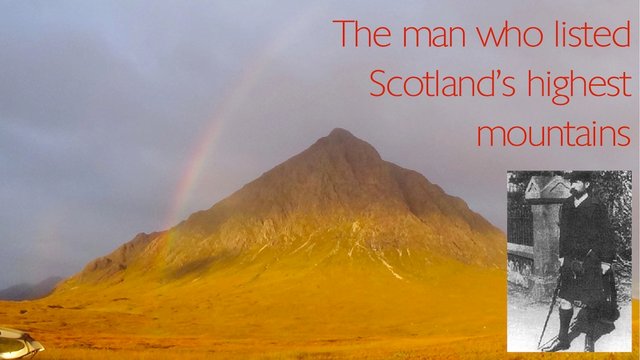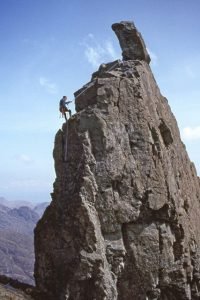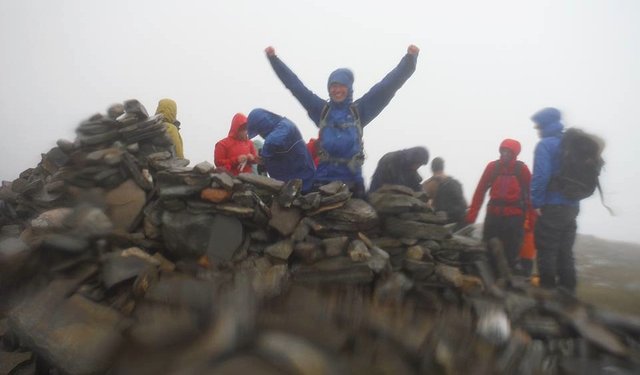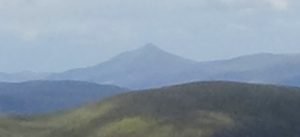Why we bag Munros: the man behind the name!

Today, 19th March 2019, is the 100th anniversary of the death of Sir Hugh Munro. Not a reason to celebrate, as the man died in tragic circumstances, but a great excuse to ponder his legacy.
Anyone who's followed my hillwalking posts will know that I'm a keen "Munro-bagger" – in fact, I've even been called a bag-lady!
What is a Munro?
A Munro is a Scottish hill or mountain with an altitude of more than 3,000 feet (915m). There are 282 of them, and Sir Hugh Munro was the man who first compiled a list of them, back in 1891. At the time, there were 283 of the mountains that now bear his name, plus 255 "subsidiary tops", or outliers to the main summits.
Over the years, improved surveying techniques together with arguments over definitions have increased or decreased the exact number of "Munros", and many other hill-types have been identified, including Corbetts (hills of more than 2,500 feet) and Grahams (hills of more than 2,000 feet).
Sir Hugh Munro started compiling his list of mountains over 3,000 feet for The Scottish Mountaineering Club (SMC), of which he was a founder member, in 1889.

The Inaccessible Pinnacle – one of the three mountains on his list that Sir Hugh Munro failed to summit. Photo by Ian Taylor.
Sadly, Sir Hugh Munro never compleated. He died of influenza in 1919, at age 63, in France, while operating a canteen for the Allied forces. At the time, he had just three 3,000 foot summits left to climb: Carn Cloich-mhuilinn, a "subsidiary top" of Beinn Bhrotain in the Cairngorms, Carn an Fhidleir, and the Inaccessible Pinnacle, or "In Pin", on Skye, which he attempted several times.
A national pastime
Sir Hugh's legacy is a new national pastime, which verges on obsession for many! People who climb all the Munros are known as "compleaters" (that's not a spelling mistake!) and this allows them access to the Munro Society. There are currently more than 6,000 compleaters – a big increase on 1970, when only 100 people had compleated.
Many Munro baggers reserve a special Munro, usually not too far away and not too difficult, so that family and friends can join them for their "compleation". Compleations are usually great celebratory occasions, with people wearing tartan or dressed in costume.

Source
Notable compleaters
• The first person to compleat the Munros was the Rev AE Robertson in 1901.
• In 1923, Ronnie Burn, also a church minister, became the second person to compleat all the Munros and the first to compleat all the subsidiary tops as well.
• The first woman to compleat the Munros was Mrs Paddy Hirst, in 1947.
• The first continuous round of Munros was achieved by Hamish Brown in 1974, over a period of 112 days. The only transport Hamish used was ferries to reach islands, a bicycle, and his legs.
• The record for the fastest continuous round of the Munros is currently held by Stephen Pyke who, in 2010, climbed all 283 Munros as there were at that time, in just 40 days.

As for me, I've climbed 106 Munros, so I still have another 176 to go. And I think it will take me a bit longer than 40 days to compleat – but I will enjoy every minute of it!

Schiehallion: the first Munro I ever climbed.

Main photo of Buachaille Etive Mor is author's own; inset photo source
All unsourced photos are author's own.
Posted from my blog with SteemPress : http://ramblingandscrambling.co.uk/mountains/why-we-bag-munros-the-man-behind-the-name/

.gif)

I did wonder where they got the name Munros from and thats some impressive achievements you listed
Yes, it's astonishing what some of these walkers and runners have achieved.
Indeed but also what you have achieved is impressive as well :)
Aw thank you! It's just doing what I love :)
and its important for us all to do the things we love ;)
I, to my shame have bagged precisely zero Munros.
I should revoke my citizenship :0D
You just haven't got started yet!
I like that way of thinking!
That's really interesting. I always though munro was some sort of Scottish word....
No - all the mountain list names (like Corbetts, Grahams and Wainwrights) are named after the people who first listed them. All except for the Marilyns (mountains of any height with a prominence of at least 150m). They were named as a contrast to Munros, taking inspiration from Marilyn Monroe!